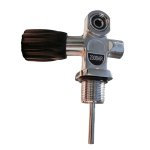Shop by Category
Info
- This product is also found in:
- Valves / Manifolds
This product is currently unavailable -
Ocean Design DIN/K Cylinder Valve - 207 bar - 230 bar - Not Oxygen Clean. The Ocean Design DIN/K Cylinder Valve is for use with both DIN and Yoke (K) regulator first stage fittings. The outlet on the cylinder valve is a five-thread 200-Bar DIN, designed to accept an included yoke adaptor insert.
This valve has a 207 bar bust disc for use with 207 bar cylinders. It's the valve supplied in Australia with Catalina 207 bar cylinders.
These are the valves supplied standard with Catalina aluminium cylinders in Australia. They are strong and reliable and are made from really top quality materials. The valve regulator connection incorporates a threaded insert, which means it can equally be used for both INT bracket (Yoke) or DIN connection.
The valve has a standard 3/4" NPSM thread to fit most Australian Standard aluminium and steel tanks/cylinders/bottles. WARNING: Please ensure that you are fitting the valve to the correct cylinder. If in doubt please ask.
Ocean Design DIN/K Cylinder Valve Features
- DIN/K Convertible valve
- There are two available pressure options 207 bar (Burst Disc) and 230 bar (Burst Disc)
- Beautiful Satin finish - Chrome Brass construction
- Easy to carry with a large hand wheel
Valve Oxygen Cleaning:
This valve is Nitrox ready up to 40%. If you are planning to use this valve on a cylinder with Enriched Air Nitrox (Nitrox) mixes from more than 40% up to 100% oxygen, it's essential for the safety of the cylinder user, and the person filling the cylinder, that the valve be oxygen cleaned and prepared with special o-rings, seats, and grease designed for exposure to pure oxygen. The cylinder should then be banded with the familiar yellow and green Nitrox band/wrap/sticker, and an Oxygen Clean 'In Test' inspection sticker applied. The Scuba Doctor can do all of this for you as an add-on service.
What is the difference between DIN "200 Bar" and DIN "300 Bar" valves?
The Deutsches Institut Für Normung (DIN) is a German standards-setting organization similar to our American National Standards Institute (ANSI) and Compressed Gas Association (CGA). DIN 477 is a specification that recommends cylinder valve outlet and connector designs for specific types of gases and pressures based upon safety considerations. These various designs have deliberate incompatibilities to preclude the possibility of errors when handling different types of compressed gases at differing working pressures.
The two valve outlets and connectors of interest for divers are the DIN 477 No. 13 and the DIN 477 No. 56 (formerly No. 50), both designated for use with compressed air. The DIN 477 valve and regulator fittings are most widely used outside the U.S. The regulator first stage DIN connector is a male screw type, and instead of clamping onto the outside of the valve as does the yoke, it screws directly into the female DIN outlet of the valve. The sealing O-ring is held in the end of the regulator connector rather than in the face of the outlet. The DIN 477 system, with its captured o-ring design, has proven to be very reliable for use with SCUBA.
Outlet/Connector #13 is from DIN 477 part 1 - for cylinders with test pressure ratings up to 300 bar and is commonly referred to in the SCUBA industry by the slang term "200 bar", probably because most cylinders with 300 bar test pressures have working pressures in the 200 bar range.
Outlet/Connector #56 is from DIN 477 part 5 - for cylinders with test pressure ratings up to 450 bar and is commonly referred to in the SCUBA industry by the slang term "300 bar". The two designs are nearly identical, but the #56 valve outlet is deliberately deeper so the shorter #13 connector will not be long enough to seat properly. This is a safety feature to prevent connecting a low-pressure device to a high-pressure supply.
It's important to understand that the "200 bar" or "300 bar" descriptions are just slang terms that have nothing to do with the pressure ratings of the outlets and connectors themselves!
(12/22 HS)










